Expedition Team Directory
Browse our directory of expedition team members who will join us on upcoming expeditions.
Our Team
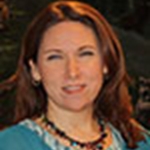
Rebecca Ingram
A research associate and archivist with the Institute of Nautical Archaeology (INA), Rebecca Ingram has studied ancient Mediterranean seafaring and trade since 2000. She earned her M.A. and Ph.D. through the Nautical Archaeology Program at Texas A&M University. Rebecca spent several years conducting archaeological research in the eastern Mediterranean, primarily Turkey. She has studied and documented a wide range of artifacts, including the 400-year-old Ottoman sultan’s galley, Kadırga, on display in the Istanbul Naval Museum, and glass beads from the Late Bronze Age Uluburun shipwreck, housed in the Bodrum Museum of Underwater Archaeology. Between 2005 and 2008, she worked year-round with the INA team at the Theodosian Harbor excavations at Yenikapı in Istanbul, Turkey, a fascinating site yielding 37 Byzantine shipwrecks. Growing up in an Air Force family, Rebecca developed a passion for travel and cultural exchange at a young age. She spent her junior year of high school as an exchange student in Hannover, Germany, and is conversant in German and Turkish. Rebecca’s eclectic experience in recent years includes creating exhibits for a natural history museum, managing museum and archival collections, and editing for an academic journal. As a historian for Lindblad in the Mediterranean, Rebecca looks forward to sharing her unique perspective on the history, archaeology, and culture of this fascinating region.
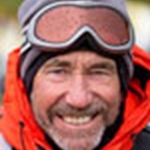
John Pailthorpe
John spent the early years of his life in London, before an inspirational teacher took him to the highlands of Scotland on a school adventure trip. From then on the natural world has been his passion. After teacher training in Bangor, North Wales, John began a thirty-year career in outdoor education centres and schools, teaching and leading children and adults in such pursuits as mountaineering, rock climbing, kayaking, and sailing throughout the U.K. and Europe. During this time John took time out to be part of six polar scientific expeditions, as a field assistant/guide. Two of these were with the British Antarctic Survey; the first a two-month field expedition to the Eklund Islands on the Antarctic Peninsula; the second, eight months as part of a king penguin and elephant seal study on South Georgia. He served as a boat skipper/field guide on a geological expedition to the northwest of Svalbard. More recently, he took part in three expeditions to the Greenland ice cap for the Scott Polar Research Institute of Cambridge, as part of the European Space Agency's “Cryosat” project. John is well aware that his career, and the wonderful experiences it has included, all began with one special teacher. With this in mind, he likes nothing more than to pass on his enthusiasm for nature and all things outdoors, with the intention of promoting an awareness and caring attitude towards the natural environment.
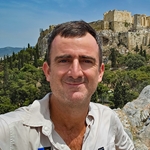
David Brotherson
Growing up near Sydney, Australia, David’s fascination for world history and archaeology was born in the civilization's, history and mythology of the ancient Mediterranean. These interests were nurtured at the University of Sydney as an archaeology major. As his undergraduate studies neared completion, David started travelling the world, which would culminate in a life-changing trip to Southeast Asia. There, in Cambodia, he stood amongst the enigmatic temples of Angkor Wat, and a new life path began to unfurl. The opportunity then arose to work with the university’s Greater Angkor Project, an international, multi-disciplinary research program into the city’s development, daily life and decline. David’s research investigates Angkorian urbanism and decline, using remote sensing, field survey and GIS to analyse its urban history, demise and transformation. He received his PhD in Archaeology from the University of Sydney in 2020. David is a long-term resident of Siem Reap, Cambodia, where he has lectured and led tour groups for over a decade. He regularly travels with National Geographic-Lindblad Expeditions throughout Asia and Europe. His archaeological research in Cambodia is ongoing, as is his passion for world history, educational tourism, the great outdoors, playing guitar and tennis.
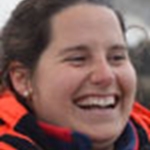
Madalena Patacho
Madalena was born and raised in Portugal. Her childhood was spent in Belem, surrounded by Portuguese maritime history, always dreaming about exploring the oceans. Her love for nature has led her to study biology and later to take a Master’s in management of natural resources, specialized in ecotourism. She has lived on Príncipe Island, off the west coast of Africa, working with local communities on a responsible tourism project. She is inspired by the principles of ecotourism and is always looking for the best ways to contribute and leave a positive footprint everywhere. To travel around the world is her biggest passion, connecting with different cultures, exploring the wilderness and having a taste of local genuine experiences. Following this passion has allowed her to extensively explore Latin America, Asia, Europe, Africa and the Arctic. Her knowledge and enthusiastic storyteller talks have taken her to several universities, lecturing about ecotourism, sustainable tourism and nature conservation. When she is not exploring the world, she dedicates her time to Ocean literacy and environmental education working as a marine educator with a variety of audiences raising awareness on ocean conservation.
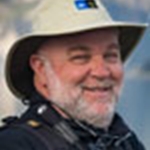
Doug Gould
Travel and adventure were an integral part of Doug’s upbringing in a small town on the south shore of Long Island, New York. Growing up on the Great South Bay, his family claims Doug learned to sail before he learned to walk. Whether it was camping, sailing, birding, traveling across country or spending most of fifth grade living in Europe, Doug’s formative years left him with a love of wildlife, the outdoors, and a desire to keep moving. After receiving a B.A. in dramatic arts from the University of California, Santa Barbara, Doug mixed a short career in the film and TV industry with two summers working for the Catalina Island Harbor Patrol, which led to his owning the third largest private marine rescue company in California. Doug sat on the Board of Directors of the Vessel Assist Association of America for three years and has lectured extensively to the marine assistance industry about safety and risk management. In 2003, he volunteered to work for Oceanites as a member of their Antarctic Site Inventory wildlife census team (aka: a penguin counter). This opportunity included numerous trips to the Antarctic Peninsula over the span of three seasons. The Antarctic Site Inventory focused on gathering data about the impact of tourism on Antarctic wildlife, and helped to develop some of the Antarctic Treaty recommendations that govern tourism today. Since 2011, Doug has worked full time as a naturalist, photographer and expedition leader, working primarily in the polar regions. In 2015 he joined Lindblad Expeditions, and continues to share his enthusiasm for travel and adventure as an expedition leader and certified photo instructor.
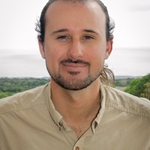
Benjamin Ayala
Ben is a German-Ecuadorian naturalist guide who grew up on San Cristobal, the eastern-most island of the Galápagos Archipelago, home to the political capital of the province. He was raised on the small Pacific island by his mother, herself a naturalist guide, but would frequently travel to Germany to visit his mother’s family there. This dual upbringing gave Ben a passion for travel to faraway places to explore both the natural world and different cultures. The more he travels, however, the more he comes to appreciate and cherish his home islands and their unique and magical natural environment. He currently splits his time between working as a Galápagos National Park naturalist guide and an ocean wildlife conservationist. His work as a conservationist with international NGOs has led him on adventures as varied as confronting the whale poachers of the Antarctic coast to collect illegal drift nets in the high seas. Defending the oceans, from which his home, the Galápagos Islands, were born and depend, is his great passion. In his free time, he enjoys photography, free diving, sailing, and surfing.
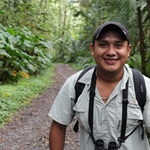
José Pérez
José Pérez was born in Panama City and grew up in the province of Coclé in the small town of El Valle de Anton; a picturesque village located in the caldera of the world's second largest volcano. From a young age he felt a deep affinity for nature, joining his grandfather and father for long walks to their farm where they would identify plants, insects, and animals. José finished secondary education in the IPT El Valle where he obtained his Bachelor of Accounting, but his interest in traveling and love of nature led him to start a career in tourism. José has 16 years of experience as a tour guide, working for five years at Canopy Tower as birding guide. He then started his career as a freelance guide leading groups in different protected areas throughout Panama and Costa Rica, working with several tour operators: including local and international companies such as Lindblad & National Geographic Expeditions. Besides being an expert birdwatcher, he has an extensive knowledge of Panama Canal history, is an experienced certified diver working with Panama Marine Adventure for almost five years.
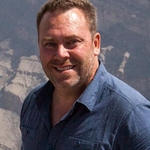
Jason Edwards
Jason Edwards has been at the forefront of natural history photography for three decades. A passion for animals and the environment defines his extensive career. Since embarking on that career at the Royal Melbourne Zoo, Jason has been recognized globally for his contributions to science, the environment, and the arts. Among other accolades, he is a two-time winner of the Eureka Prize for Science Photography, three-time winner of Communication Arts Photography Annual, two-time winner of the ProMax Golden Muse, and winner of the Australian Geographic Society's Pursuit of Excellence Award. Through his commissioned work and as the face of the National Geographic Channel’s Pure Photography, Jason has taken his storytelling to dozens of countries and to every continent. He is an associate fellow of the International League of Conservation Photographers and uses his lens to narrate and highlight issues affecting wildlife, the environment, and indigenous communities. His work has been featured in hundreds of publications including National Geographic magazine, BBC Wildlife, Australian Geographic, Sports Illustrated, Condé Nast Traveler, and The New Yorker. Jason is also an author of science education books, and his imagery has appeared in everything from environmental campaigns to Hollywood blockbusters.
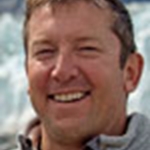
John Mitchell
Raised in the mountains of Crested Butte, Colorado, John has always been a “child of nature,” where the natural world around him was life’s classroom. After graduating from Colorado State University with degrees in Speech Communication and Biology, John joined Lindblad Expeditions. Over the years with Lindblad he tried to learn every aspect of vessel operations while spending his “free time” learning all that he could from the naturalists on board. His time off the boats was spent traveling throughout North, South, and Central America learning more about the areas. John left “for a spell” to pursue a post-graduate degree in marine ecology in Hawaii, fell in love with island life and now calls Maui home. Most recently working as a Coastal Management Specialist for NOAA Pacific Region, he has also been the Program Director for an educational non-profit whose mission was to excite youth about science and all things natural. John has also served as a naturalist, junior high and high school marine science field teacher. He also worked on the Marine Turtle Research Project, and spent five years as the Fish and Habitat Monitoring Coordinator for the State of Hawaii. John is passionate about the need to re-connect our youth to the environment in order to sustain meaningful education.
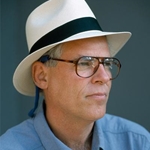
Macduff Everton
Photographer Macduff Everton has shot multiple stories for National Geographic Traveler, and covered diverse regions on projects from Patagonia to Japan to the Scottish Highlands. His other editorial clients include Life, LA Times Magazine, NY Times Magazine, Outside, and Smithsonian. Macduff’s photography focuses on sense of place, whether portraits of individuals or portraits of a landscape. His books include Patagonia La Última Esperanza (University of Texas Press), The Western Horizon (Abrams), The Modern Maya Incidents of Travel and Friendship in Yucatán (University of Texas Press) and Los Mayas Contemporáneos Incidencias de Viaje y Amistad in Yucatán (Universidad Intercultural Maya de Quintana Roo), the latter two he wrote and photographed over a period of decades. His work is in the collections of many public and private institutions, such as the Bibliothèque Nationale in Paris, the British Museum in London, the International Center of Photography in New York, the Museo de Arte Moderno in Mexico City, and the Museum of Modern Art in New York. Macduff has also taught workshops nationally as well as in Mexico and Tuscany.
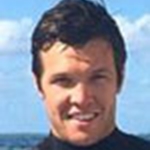
Chris Cook
A self confessed “animal nerd,” Chris falls under many titles: marine biologist, marine interpreter, dive master, science communicator, and naturalist. Chris was lucky enough to grow up on the East Coast of Australia, where there are no shortage of different coastal environments to explore. While growing up, his friends would be surfing while he would be under the waves, snorkel and mask on looking for fish and all the weird and wonderful creatures he couldn’t get enough of. This love of the ocean lead to him completing a Bachelor of Science in 2005. His passion for the ocean and connecting people with its inhabitants landed him in various roles in different zoos and aquariums, but it was the "wild" that was always Chris’s true calling. After working as a whale watching tour guide off the West Coast of Canada and moving back to Australia to work on the Great Barrier Reef, Chris never looked back. Since 2009 Chris’s specialty has been giving presentations on and taking people out to tropical environments, in particular to different parts of the Great Barrier Reef region. In recent years Chris has spent more time living on tropical islands or on ships cruising up and down the reef than on land. Chris’s passion for photography, nature’s creatures, and scuba diving has taken him from diving in the snow in Canada one week to diving in Mexico the next. He has followed his passion to develop his photography and interpretative skills through out Southeast Asia, all along the East Coast of Australia and to the magical Kimberley region off the west coast. The only passions of Chris’s not mentioned are reptiles, birds, insects, dogs, the entire macro world, and of course talking about all of the above over good coffee!
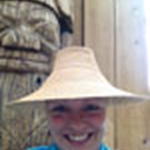
Elsie Stewart-Burton
Elsie Gale is of the Ts'aahlth Laanaas Stastas Gitlun—a double Eagle, Eagle, Beaver, Sculpin and Frog clan from Hydaburg, Alaska, the most northern of Haida villages. Her Haida name is IL'skide and she was raised in the traditional Haida ways, learning about her family lineage and histories, songs and dance and food gathering throughout the seasons. She loves hunting, fishing, camping, picking berries, beach greens, teas and basic medicinal herbs. Elsie lived in Old Massett for 20 years where she raised two beautiful sons and worked as an entrepreneur. From 2008 to 2011, she opened and ran a studio/gallery in Ketchikan, Alaska, featuring Haida art as well as native art from many tribes of Alaska and British Columbia. She began learning Haida art in her youth and continued her studies by learning to make traditional Regalia and basic cedar weaving. From 2004 to 2006 she had the distinct honor of apprenticing with Master Haida Weaver Evelyn Vanderhoop to learn Raven's Tail and Naaxiin wool weaving which she demonstrated in her gallery and continues to make to this day! In 2012 Elsie returned to Haida Gwaii, choosing Skidegate as her residence. Since moving home she worked one season as a Haida Gwaii Watchman in Gwaii Haanas, then next as an interpretive officer for Gwaii Haanas National Park Reserve, and has now opened and is operating her own inn in Masset.
Showing 12 of 402
